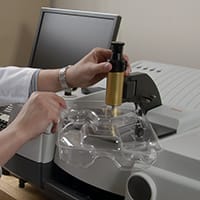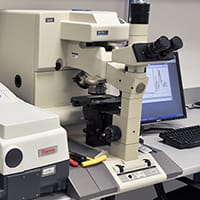Fourier Transform Infrared Spectroscopy


Fourier Transform Infrared Spectroscopy Testing
Stress Engineering Services uses Fourier Transform Infrared Spectroscopy (FTIR) to identify organic compounds, polymeric materials and additives. FTIR testing is a common technique used to identify unknown polymers and organic compounds.
FTIR is a classic reverse engineering technique that can be used to determine a polymer class (thermosetting vs. thermoplastic) and family (i.e. Nylon, Polyethylene, Polypropylene). By focusing on subtleties in the spectra produced for polymers, further identification and delineation is possible (i.e. Homopolymer Polypropylene can be differentiated from Copolymer Polypropylene).
FTIR is generally a surface technique (i.e. infrared penetration of 2-5 μm). However, it is capable of determining whether a material has been contaminated and in some cases, degraded. The fingerprint for each material is unique and distinct. In certain cases, FTIR must be coupled with other techniques (such as Differential Scanning Calorimetry, Raman Spectroscopy, or SEM).
Our staff conducts analysis using both standardized and customized methodology. A list containing common test methods is shown below. Employing a database with 1000s of library spectra, we are capable of identifying most unknown materials.
Standard Tests:
ASTM E168: Quantitative FTIR Analysis
ASTM E1252: Qualitative FTIR Analysis
Instrument Capabilities:
- Micro-FTIR: Available
- Diamond Plate: Available
- Germanium Plate: Available
- Liquid Samples: Yes
- Solid Samples: Yes
- Library Spectra: >13,000



